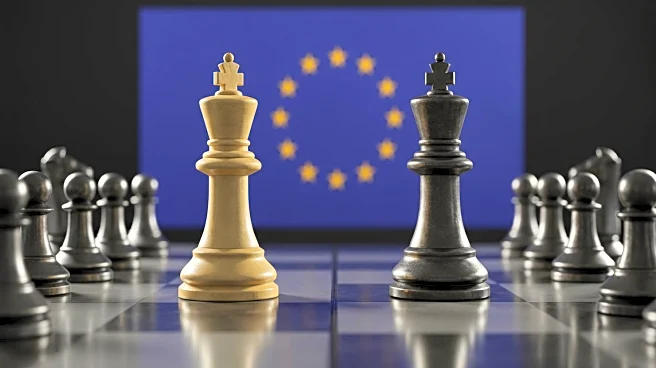What's Happening?
President Trump is set to meet Russian President Vladimir Putin in Alaska to discuss a potential ceasefire in the ongoing conflict between Russia and Ukraine. This meeting follows a joint call with Ukrainian President Volodymyr Zelensky and other European leaders, who emphasized the importance of Ukraine's territorial integrity. Prime Minister Sir Keir Starmer has expressed optimism about a viable ceasefire, highlighting the need for lasting security guarantees. The UK is showing support through a high-profile meeting with Zelensky at Downing Street, coordinated just before the Alaska summit. Vice-President JD Vance, currently on a private visit to the UK, has reiterated Trump's mission to bring peace to Europe.
Why It's Important?
The potential ceasefire between Russia and Ukraine could significantly impact European security and international relations. A successful agreement may stabilize the region and prevent further territorial disputes. However, concerns remain about the conditions of the ceasefire, including possible territorial concessions by Ukraine. The coalition of European countries supporting Ukraine, including military and economic measures, underscores the geopolitical stakes involved. President Trump's involvement is crucial, as his diplomatic efforts could lead to a breakthrough in a conflict that has persisted for over three years.
What's Next?
The upcoming summit in Alaska will be pivotal in determining the future of the Ukraine conflict. Stakeholders are likely to react based on the outcomes, with potential shifts in military and economic strategies. European leaders may increase pressure on Russia through sanctions if necessary, while Ukraine remains firm on not ceding territory. The coalition of willing countries may deploy military support to ensure compliance with any peace agreement. The international community will closely monitor the developments, as they could reshape alliances and influence global security dynamics.
Beyond the Headlines
The ethical implications of territorial swaps and the enforcement of international borders are significant. The conflict raises questions about sovereignty and the role of international alliances in conflict resolution. The long-term impact on NATO and European security architecture could be profound, influencing future military and diplomatic strategies. The situation also highlights the importance of diplomatic engagement and the challenges of balancing national interests with global peace efforts.









